 loading
loading
featuresCan a book change the course of your life?Seventeen Yale professors describe the works that became their turning points. From Rome to Physical Chemistry, from Thomas Mann to A. A. Milne: no one can predict what kind of author, subject, or emotion in a book might cause a shift in their life’s path. We asked a number of Yale professors to tell us about one major literary influence they’ve experienced. Here, you can read the replies of those who responded. One entry deserves a special note. Professor Lamin Sanneh generously answered with some thoughts about Helen Keller. Sadly, he died very soon after writing to us. We honor his memory and are glad to be able to share his experience of finding inspiration in her autobiography.—The Editors
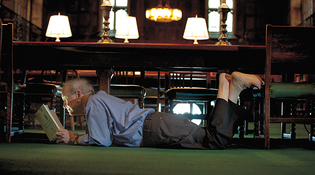 Mark OstowView full imageJohn Lewis GaddisRobert A. Lovett Professor of Military and Naval History “Winnie-the-Pooh, because each of the animals has a distinctive personality. I’ve found it an invaluable guide, therefore, for navigating life, classrooms, and department meetings.”
Barry NalebuffMilton Steinbach Professor of Management, School of Management “In 1980, I paid £4.90 at Blackwell’s Bookshop on 48–51 Broad Street, Oxford, for a paperback copy of Thomas Schelling’s The Strategy of Conflict. At the time, the book was already 20 years old, and yet it was unmined territory. (It would be another 25 years before Schelling would win The Sveriges Riksbank Prize in Economic Sciences in memory of Alfred Nobel.) In this book, a world opened up to me—the math I had learned at MIT could now be applied to real-world problems of threats, promises, credibility, commitment, focal points, brinkmanship, and deterrence. These strategic problems have kept me busy for the last 38 years. For those looking to share in Schelling’s unique worldview, I’d suggest starting with his 1984 book, Choice and Consequence.”
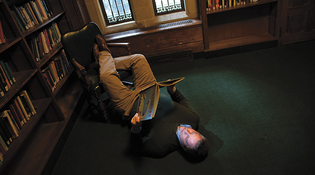 Mark OstowView full imageDavid SkellyDirector, Yale Peabody Museum of Natural History; Frank R. Oastler Professor of Ecology, Yale School of Forestry and Environmental Studies “What do you give to a five-year-old after he had seen the Peabody’s Brontosaurus and won’t stop asking questions? Jane Werner Watson’s Giant Golden Book of Dinosaurs and Other Prehistoric Reptiles (1960), illustrated by Rudolph F. Zallinger. Even if the science underlying them is now dated, Zallinger’s illustrations remain just as powerful as when they ignited in me a passion to understand the natural world.”
Harold BloomSterling Professor of the Humanities, Professor of English “Shakespeare. He had a vocabulary of more than 37,000 words, 1,700 of which he had coined. Though I continue to cause controversy by this statement: he invented the human, in the sense that he created what we now call ‘personality.’ His emotions have become our thoughts. His thoughts are now our feelings.”
Peter Salovey ’86 PhDPresident of Yale University, Chris Argyris “Books that are most special to me are often the ones I have shared with others. Cutting for Stone, by Abraham Verghese, shows readers that ‘doing the right thing’ should always be the priority even in complicated political, cultural, personal, and professional settings. In retirement, my father began reading historical novels, and we enjoyed many lively discussions about themes that resonated with us. He and I read Cutting for Stone at the same time, and it will always be special to me for that reason.”
Lamin SannehDr. Sanneh (1942–2019) passed away not long after sending these words. He was the D. Willis James Professor of Missions and World Christianity, Yale Divinity School; and Professor of History, Professor of International and Area Studies. “Helen Keller’s autobiography, The Story of My Life, changed the course of my life. Growing up in a corner of Africa noted for hit-and-run explorers and adventurers passing through in their search for the famed gold fields of the interior, I had just learned to read and write, defying old-fashioned traditional strictures against Western education. When I chanced upon torn pages of the book in a refuse dump, I read with avid attention the trash-encrusted words of her testimony about knowledge as power. It sparked my curiosity and shaped my future career.”
Laurie SantosProfessor of Psychology “The book that really changed my outlook the most is The Enchiridion by Epictetus, one of the famous Stoic texts. The Enchiridion teaches you that there are some things you can control, and some that you can’t. It’s had a huge impact on how I frame the things that happen to me, and how I try to live my life.”
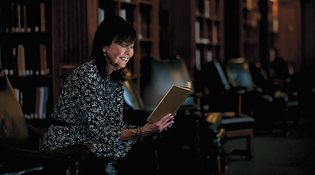 Mark OstowView full imageDiana E. E. KleinerDunham Professor in the History of Art and Classics “I fell in love with Rome before I read Marguerite Yourcenar’s Memoirs of Hadrian when I was an undergraduate at Smith College. Yet this exceptional book helped me understand my innate passion for Rome as city and empire and how a unique Roman patron used architecture to capture the essence of Romanitas—being Roman. Equally unforgettable was how a French woman could vividly inhabit the persona of one of Rome’s quintessential male leaders, the ultimate patron of the Pantheon and creator of Hadrian’s Villa at Tivoli, who alternately traveled the empire with his wife Sabina or his young male lover Antinous. Yourcenar’s brilliant journal has long inspired me to think that nothing is impossible, in art and architecture, and in life.”
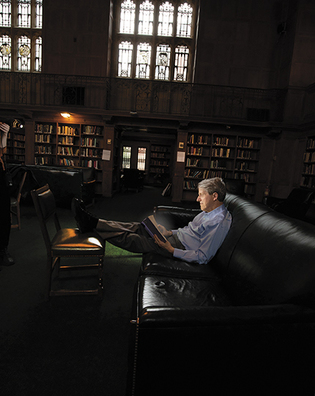 Mark OstowView full imageRobert ShillerSterling Professor of Economics “Richard Prum’s book The Evolution of Beauty has had an influence on my thinking about economics. There are striking parallels, which his book brings out, between speculative bubbles in the stock market—with investors chasing glamorous but sometimes insubstantial stocks—and those dramatic and flamboyant birds, like peacocks, whose feathers are largely there to impress other birds. Adopting appearances for show or for fooling others is not only a human trait, but also occurs throughout nature. Still there is a mystery why some of those birds, in their plumage and their songs, are beautiful to us humans too.”
Richard PrumWilliam Robertson Coe Professor of Ornithology, Ecology and Evolutionary Biology and Professor of Forestry and Environmental Studies “For my tenth birthday, my parents gave me Birds of North America: A Guide to Field Identification by Chandler Robbins, with illustrations by Arthur Singer. The colorful paintings, maps, concise text, and exhaustive detail opened a window into the marvelous world of biodiversity. I climbed through it, and I am still at play there.”
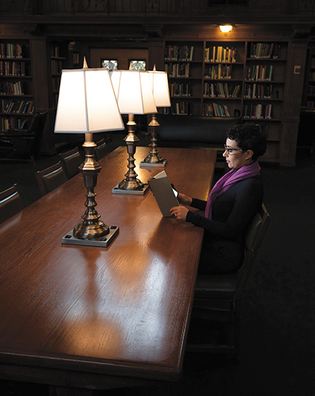 Mark OstowView full imageMiriam GoharaClinical Associate Professor of Law, Yale Law School “After college, I read Jonathan Kozol’s Amazing Grace, gorgeous narrative nonfiction about shameful poverty that kids in the South Bronx shoulder with grace no child should have to muster. It left a profound, lasting impression and taught me that textured personal stories kindle the empathy necessary to ignite social change.”
Harold KohSterling Professor of International Law, Yale Law School “The story of how the Kennedy administration found the best solution to the Cuban Missile Crisis is a public policy case study, but Robert Kennedy also tells the gripping tale of those 13 days from the perspective of the attorney general, a lawyer/policymaker, former campaign manager to the president, and the president’s brother and closest confidant. The book—Thirteen Days: A Memoir of the Cuban Missile Crisis—was the first to give me a sense of what it was actually like to be a government official and lawyer living through a life-and-death global crisis, and it made me want someday to also be ‘in the room where it happens.’ When I got to those rooms, as a justice department lawyer in the 1980s, as a state department human rights official in the 90s, and as the state department’s legal adviser starting in 2009, I would sometimes thumb back through the book to remind myself of how much had changed—the evolution to a multipolar world, with e-mail, video conferences, instantaneous information through the web and cable news—yet how much had stayed the same: the need to stay focused as a team on finding solutions that satisfied both legal and policy imperatives and long-term global objectives.”
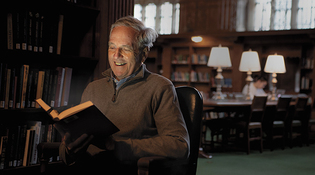 View full imageMurray BiggsAdjunct Associate Professor (Retired) of Theater Studies “A sociology professor in college urged all his students to read The Magic Mountain. Thomas Mann spent 12 years bringing this novel to its publication in 1924. Its setting in a tuberculosis sanatorium in neutral Switzerland suggests metaphorically that it was possible to recover from such catastrophic years and that some place of spiritual retreat and reflection is always available to us, somewhere: a lesson that I’ve never forgotten.”
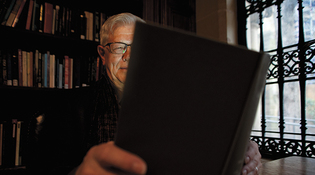 Mark OstowView full imageGary HallerResearch Professor of Chemical and Environmental Engineering “My early goal in life was to escape the Nebraska farm. The escape plan was college preparation for high school math teaching, but I was introduced to chemistry in college. That instructor suggested I might become a college teacher, described how I might do that, and guided me to admission to graduate school at Northwestern. I split my first year taking two courses each in math and chemistry. One of the two chemistry courses was undergraduate physical chemistry and the text was Walter J. Moore, Physical Chemistry. This text, and an engaging teacher (who later became my PhD adviser), changed my life by setting me on the road to a PhD in physical chemistry that made me into a chemical engineering professor at Yale.”
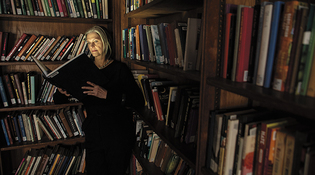 Mark OstowView full imageDeborah BerkeDean, Yale School of Architecture “As a young child—three or four years old—I pored over my mother’s well-worn copy of Helen Gardner’s Art Through the Ages. I remember being fascinated by the variety of images in the tipped-in plates, which helped me develop a visual vocabulary before I could even read well. It was the beginning of my lifelong love of art and certainly an influence on my decision to become an architect.”
Stephen RoachSenior Lecturer, Jackson Institute “Is it always darkest before the dawn? While there can be no mistaking the darkness that has enveloped America’s spirit over the past two years plus, the dawn remains elusive. In The Soul of America, Jon Meacham gives us hope by bringing heroic leaders back to life in their own words—leaders from Lincoln to Margaret Chase Smith who rose to the occasion and saved a nation from a broken spirit. Tough, therapeutic, and ultimately uplifting.”
Traugott LawlerProfessor Emeritus of English “The book that had more impact on me than any other is Pride and Prejudice, which I read when I was 16 because my English teacher told me to. It blew me away! I had never imagined a novel could be so intelligent, so witty, so compelling. It made me a reader of nineteenth-century English fiction, as I still am, and it set me on a path to my career teaching English.”
The comment period has expired.
|
|